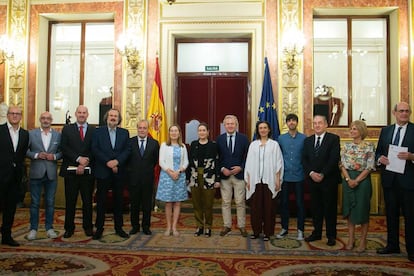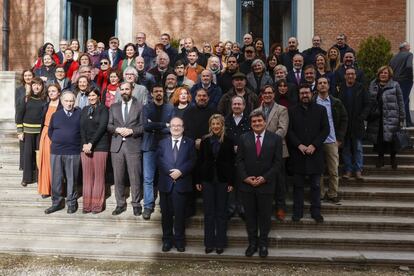The Statute of the Artist was to be the cultural policy phenomenon of the season. It has turned out, however, that it is never the current one: always the next one. In 2018, Congress unanimously assumed the political commitment to move it forward. The deputies took photos with their report, the culture became enthusiastic: finally, the reform called to improve so many intermittent lives would appear. Many changes, in fact, went ahead. However, the expected full premiere has not yet arrived. And instead of the applause of that time, some whistling is beginning to be heard: the approval of several key measures is between “stuck” and “stopped”, in the description of four representatives of the arts who participate in the conversations with the Government. No one knows how long.
The document agreed upon in 2018, thanks to the work of a subcommittee ad hoc in Parliament, sought to recognize and regulate a job that varies every month or even every week, like income, with times of intense activity and stages where the cell phone never rings. That report marked 75 points and about 60 specific measures, several of which are already in force: the compatibility between receiving the pension and income from artistic activities of any type; an unemployment benefit that requires fewer days of contributions; or a new artistic employment contract.

However, fiscal, labor or health fronts remain open. Specifically, discounts and deductions in VAT and personal income tax; a different treatment for income, to take into account what another source explains: “Cultural production takes years, and you can spend a long time investing and without income. Only when it is developed does the profit arrive, but the Treasury taxes it as if it were all concentrated in that period. We ask to account for it over the years.” Recognition of specific occupational illnesses is also demanded, such as hoarseness for a singer.
It is also necessary to complete changes that began but were not completed: especially, a comprehensive review of the figure of the self-employed cultural worker, with self-employed quotas adapted to intermittency — only one was introduced, of 167.31 euros per month , for those who earn less than 3,000 euros per year—and a benefit for cessation of activity that takes into account intermittency. But also complete the modification of the Royal Decree of 1985 that still regulates the employment relationship of artists in some aspects that were not updated in 2022: the regulation of workers under 16 years of age or the reduction of abuses in on-time hiring must be defined. partial, among other points.
So many issues, and so complex, that they challenge at least four ministries: Culture; Work and Social Economy; Tax authorities; Inclusion, Social Security and Migrations. And with the four the sector participates in negotiations, or working groups. With Education, according to the four sources, there are hardly any relevant fringes, since The reform of artistic education became law.
A source from the Ministry of Culture emphasizes that “a lot of progress” was made in the previous legislature “thanks to Labor” (both departments directed by Sumar, the Government’s minority partner), although he recognizes that the points that remain “have been paralyzed by the Treasury and Social security”. And he adds that Sumar has precisely set as priorities, in the negotiation with the socialists within the Executive on the General State Budgets, the aforementioned requests from the cultural sector regarding personal income tax and VAT. At the same time, he points out that they are analyzing with Social Security the possible “hyper-reduced quota” for the self-employed. The Ministry of Labor reports that, in its area, “80% of the regulatory agenda on this matter has been carried out.”
But time keeps passing. Already in 1980, UNESCO recommended that its member states create adequate regulatory frameworks for the cultural sector. And many creators argue that the pandemic wreaked even more havoc in their field because the entire Artist Statute was not in force. “This time the work will be completed,” said the then Minister of Culture, Miquel Iceta, in December 2021, in a joint press conference with the still vice president and Minister of Labor, Yolanda Díaz. It hasn’t happened yet.

The electoral advance decreed by President Pedro Sánchez, in May 2023, stopped the clock for another year, according to the four sources. In March 2024, the Minister of Culture, Ernest Urtasun, chaired the Commission Interministerial for the Development of the Statute of the Artist, which decided to “immediately reactivate” all working groups ad hoc. But sources assure that the first meeting of the sectoral associations with the Treasury did not arrive until early July 2024. For the Social Security meeting, they had to wait until September. And its agenda at the moment has only one other scheduled meeting, this month, to discuss personal income tax with the Treasury. For their part, Labor affirms: “A calendar was established, a deadline was given until the end of September to receive proposals from the sector. There were many, some very interesting. We must analyze them thoroughly and we will send our own proposal.”
A Treasury spokeswoman recalls that a royal decree approved last December introduced incentives for patronage along with another measure of the Artist Statute, which seeks to compensate for another lack of protection for intermittent workers: “Associations of professionals in the artistic and cultural sector (…) whose purpose is their defense and protection will be legitimized to defend the rights and interests in court. of its associates and those of the association, as well as the general interests of self-employed or self-employed workers in art and culture.” And he adds that the Treasury’s intention is to “continue advancing the legislative agenda of the Artist Statute.”
But the sources consulted emphasize that the loss of time is also a loss of resources: their associations pay advisors and lawyers to support them in a process that takes forever. A replacement in a ministerial department is enough, moreover, to return to square one. “I have met with certain institutions five or six times in a few years because the direction changed and I had to explain everything from the beginning,” laments a source. “It is difficult enough to break down the specificities of the sector, to understand them and to empathize with them…”, points out another. “The members ask us for an account and it is difficult to tell them that there was an initial meeting again,” concludes a third.
The fatigue is growing with one of the star projects recently launched by the department directed by Urtasun. The new Cultural Rights Plan aims to emerge from a participatory process with the sector and citizens, to prepare a diagnosis and a roadmap. However, sources feel they are encouraged to collaborate on a proposal which Culture describes as a “priority line of action”, while the Artist Statute is delayed. The four interviewees recognize the interest and relevance of Urtasun’s initiative, which they appreciate, but they hope that it will not be at the expense of the real priorities of the sector. “It makes one blush to see a plan with 13 such ambitious axes, and that none of them include the Artist Statute or promote this work,” says a source. “If the sector is dismantled, there can hardly be any rights left to guarantee,” adds another. It is often said that culture stimulates enriching debates. But, first, artists ask to stop impoverishing themselves.
Archeology makes its voice heard
The archaeologist Ángel Astorqui represents the State Platform of Archeology Professionals (PEPA) at the negotiation tables of the Artist’s Statute, which has associate members in 14 of the 17 autonomous communities. The main demand of this group is that they be taken into account in the final text as “cultural workers, with their own code of activity” and that they not be included in the group of “other technical services,” Astorqui says by phone. “The current situation in a precarious sector like ours is that, for example, the application for aid is prevented.”
Astorqui emphasizes that, although the disposition of the Ministry of Culture “is being good” in the discussions on the Statute, the main obstacle comes from the Ministry of Finance, in issues such as “deductible expenses” of a group where, in the case of Those who belong to PEPA, “90% are self-employed, self-employed.” Another objective is “to be in the educational system, until now only a few universities include the degree in Archeology.” This platform will participate tomorrow, Friday the 18th, in a meeting of archeology professionals and companies from Spain and other European countries in Vitoria, in which their aspirations will be discussed in the final drafting of the Statute, as well as in the next National Archeology Plan. which is in the preparation phase by the ministry and whose approval is expected before the end of this year.
Babelia
The literary news analyzed by the best critics in our weekly newsletter
RECEIVE IT


